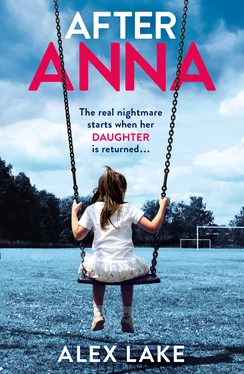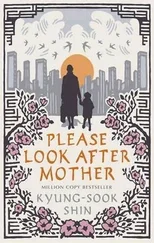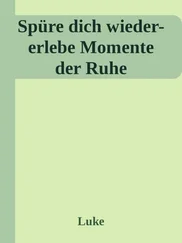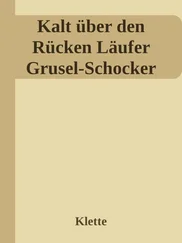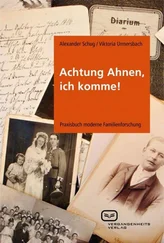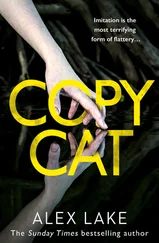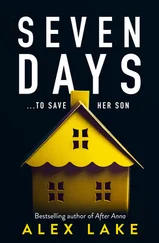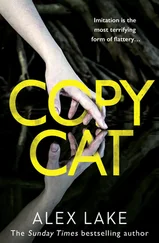They went there, once or twice every month. They left the car parked outside the school gates, walked down the hill, and went to buy sweets. It was about the only thing they ever did straight after school, the only thing that Anna knew. And she loved it.
So she was there, Julia knew it and as she sprinted she knew she was going to get there and find her daughter and sweep her up into a protective embrace from which she thought she might not ever let her go.
The bell above the door jangled. Julia took a couple of quick steps into the shop, looking wildly from corner to corner.
‘Hello,’ the owner, a retired postal worker called Celia, said. ‘Can I help?’
‘Has my daughter been in?’ Julia asked.
The owner thought for a second, trying to place Julia. ‘Your daughter’s Anna, isn’t she? A dark-haired little girl? Likes chocolate mice?’
‘That’s her. Has she been in?’
The owner shook her head. ‘No,’ she said. ‘She’s a bit young to come in on her own.’
‘Are you sure?’
‘I’ve been here all afternoon. Hardly anyone has been in, and I’d remember her, especially if she was alone.’ Celia leaned forwards. ‘Is everything OK?’
Julia looked past the foot-long lollipops and chocolate rabbits to the street outside the shop window. Anna wasn’t here. She was somewhere out there.
Somewhere. Out. There.
Now the panic did take hold. She turned back to the Celia, her legs weakening.
‘I’ve lost her,’ she said. ‘I’ve lost my daughter.’
iii.
It happens to every parent, one time or another. Perhaps in a supermarket, perhaps in the library, perhaps in the back garden.
You look around and your child is not there.
‘Billy!’ you shout, then, a little louder. ‘Billy!’
And Billy replies, and comes toddling into view, holding a bag of flour, or a book, or with a worm in the grip of his pudgy hands. Or maybe he doesn’t, and you have that sudden lurch of fear, that tightness in the back, and loose feeling in your stomach, and you look around a little wildly, before running to the end of the aisle or to the kids’ books section or to the back gate, and there he is. Little Billy; safe and sound.
And you swear you’re going to make sure you don’t let them out of your sight again, not for a second, because a second is all it takes.
And a second is all it takes. In one second, a kid can step out from behind a parked car or be shoved into a van or even just walk round a corner and get lost enough that it takes you ten agonizing minutes to find them, which, although agonizing, is the best possible outcome. You find them sitting on a bench chatting to a kindly stranger or playing with some kids they met or just wandering about absorbed in all the things they are seeing on their own for the first time.
And then you really swear that you aren’t going to let them out of your sight again, because, in that ten minutes your mind races to the worst possible conclusions: they’ve fallen in the canal, they’ve been hit by a car, they’ve been abducted.
And that’s the one that bothers you the most. They’ve been taken. Picked off the street in a neglectful moment and taken. Gone forever. Alive or dead, it doesn’t matter. You won’t ever see them again, but you won’t ever be able to stop looking. And you won’t ever forgive yourself.
But, of course, even when you’re contemplating that horrific, tortured possibility, a still, calm voice at the back of your mind is telling you not to worry, that everything is ok, that it’ll all work out because it always does.
Except it doesn’t. Not always.
And you know that. Which is the most frightening thing of all.
Julia ran out of The Village Sweete Shoppe. She glanced left and right: the same choice again. Left into the village or right, back to the school. She turned left and jogged down the hill. If there was news at the school someone would phone her. At least this time her phone was charged.
A woman of her age, with short hair and an expensive-looking bag, was walking towards her. Without thinking, Julia caught her eye.
Julia, like many English women of her age and social class, had an aversion to both making a scene and bothering people that bordered on the pathological. She would no more have asked a stranger for help – to lend her money, perhaps, or let her use their mobile phone, or get assistance changing a car wheel – than she would have walked unannounced into their kitchen, opened their fridge, and made herself a salad.
This, though, was different. It was not a time to worry about social proprieties.
‘Excuse me,’ Julia said. ‘I’m looking for my daughter. She’s five, she has dark hair and a pink rucksack, and she’s in school uniform. Have you seen her?’
‘No,’ the woman replied. Her face took on an odd expression, a mixture of concern and sympathy that Julia found discomfiting. ‘Has she been missing long?’
‘Not that long. Twenty minutes. Maybe more.’
The expression deepened into a frown. ‘Gosh. That’s a long time.’
‘I know,’ Julia said. ‘Would you keep an eye out for her?’
‘Of course. I’ll help you.’ She gestured to the village car park. ‘I’ll look around the car park and check the library. There’s a playground round the back. She might be there.’
‘Thank you,’ Julia said. ‘Her name is Anna,’ she added. She set off down the slope. On the right was a pub; on the left a post office, although neither seemed the same as it had the last time she had seen them. Then they had been simple buildings, parts of the infrastructure of the village, communal places that offered warmth and light. Now they were threatening; places where Anna might be kept hidden.
She put her head around the post office door. There was a queue of four waiting for the one open booth.
‘Excuse me,’ she said, aware of her breathlessness. ‘I’m looking for someone. My daughter. Anna. Maybe you’ve seen her in the village?’
‘What’s she look like?’ a man in paint-splattered overalls asked.
Julia gave the description. It was already horribly familiar: dark hair, rucksack, school uniform. It fitted many five-year-old girls, but that didn’t matter, because there was one element that marked Anna out from all the others.
‘She’d have been alone,’ Julia said.
After a sympathetic pause – Julia was already starting to hate sympathetic pauses – followed shaking heads, murmured negatives: she hadn’t been in, and they hadn’t seen her.
Julia ran across the road to the Black Bear pub. It was dark inside, the windows grimy, the smell of smoke still lingering despite the ban on inside smoking. There were only three customers: an underage couple skulking in the corner and a man at the bar.
There was a woman tending the pumps. Julia walked over to her.
‘Excuse me,’ she said. ‘I’m looking for my daughter. She’s five.’
‘A bit young to be in here, love,’ the woman said. She was in her early fifties, Julia guessed, but looked older. She had heavily tattooed forearms and a lined face and was wearing a push-up bra.
‘I thought, maybe, she wandered in,’ Julia said. ‘I’ve lost her.’
The man at the bar looked up from his newspaper, his nose and cheeks red with broken capillaries.
‘Not seen her,’ he said. He patted the stool next to him. ‘I’ll buy you a drink, though, darling.’
The woman behind the bar – probably the landlady – shook her head in disapproval, but she didn’t say anything. She probably didn’t want to upset a regular. Couldn’t afford to. The pub was shabby; it didn’t look as if it was doing so well.
‘Can’t help you, love,’ she said. ‘Not seen her.’
Читать дальше
